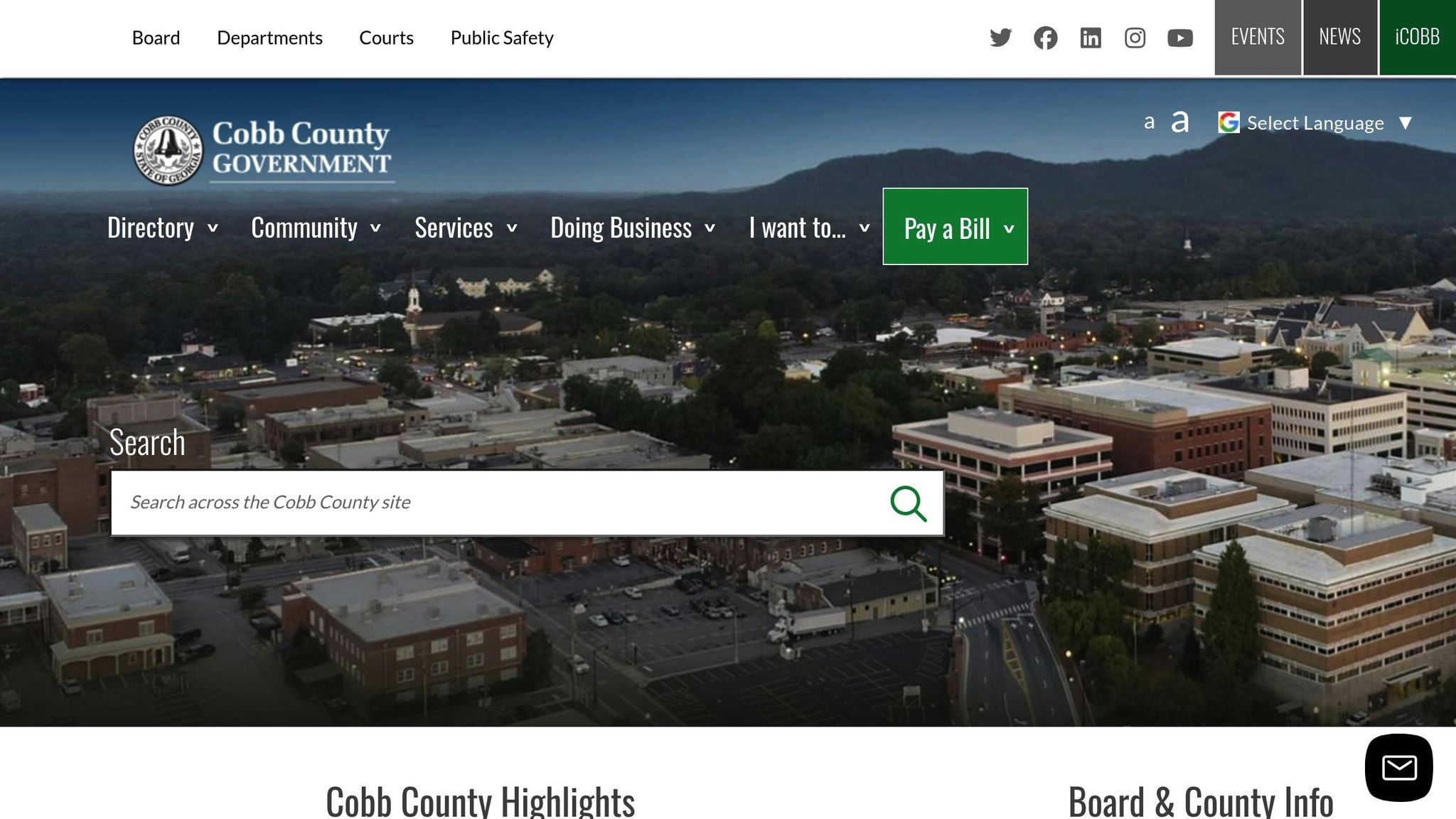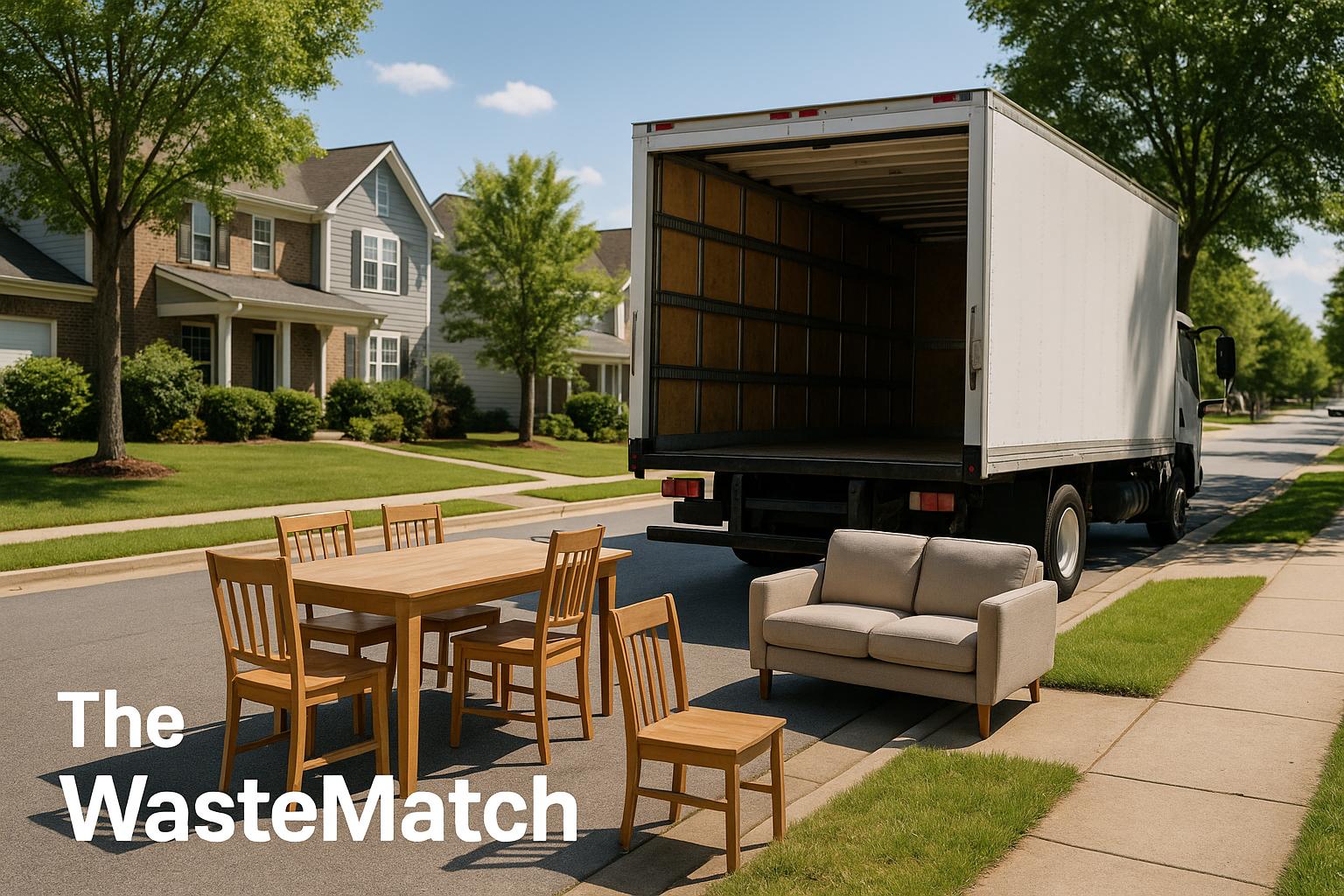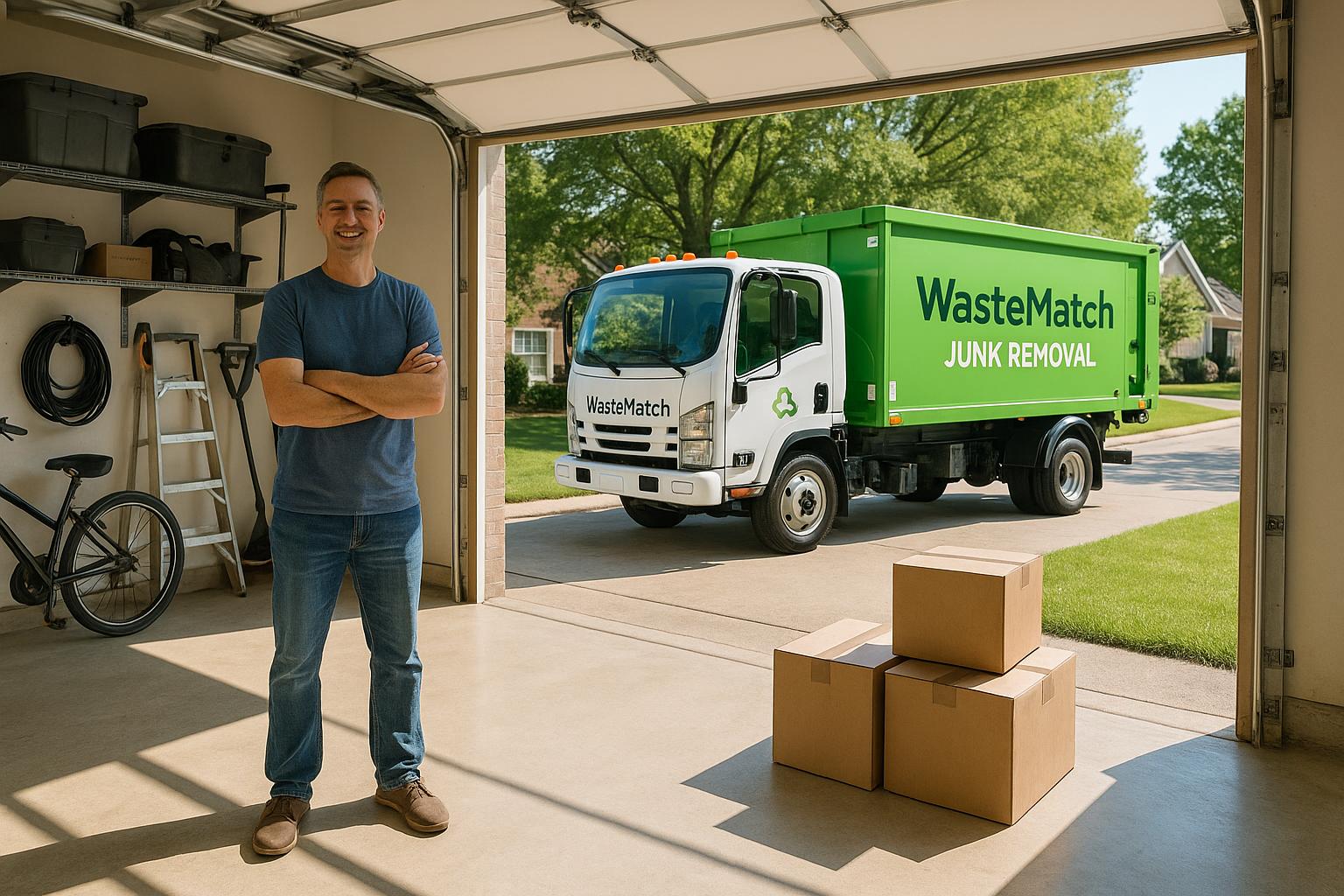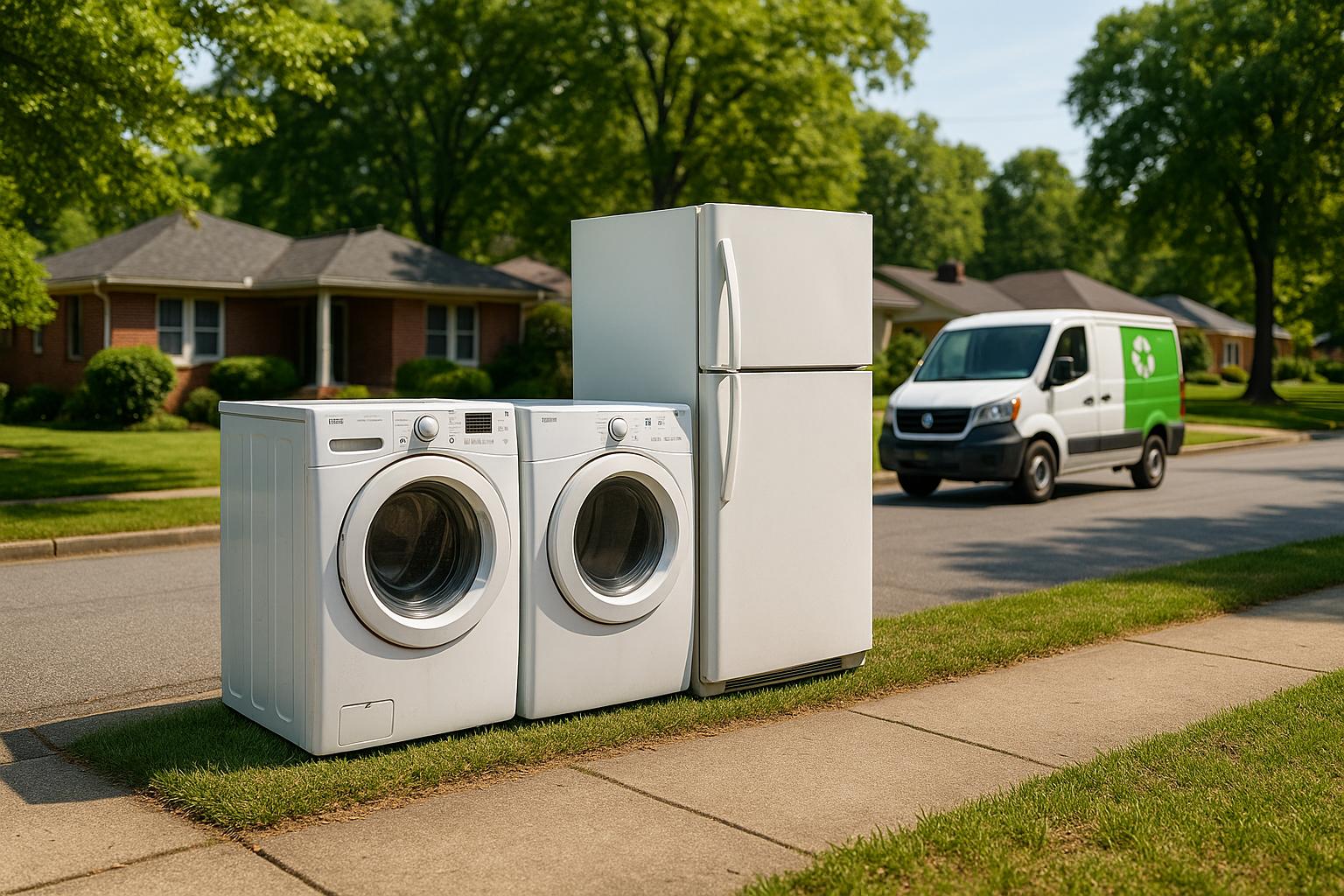Need a dumpster for your construction project in Cobb County? WasteMatch offers a simple solution with same-day delivery, clear pricing, and sizes for every job. Whether you're remodeling a kitchen or managing a demolition, renting the right dumpster keeps your site clean, safe, and compliant with local rules. Here's what you need to know:
- Dumpster Sizes: From 10-yard for small remodels to 40-yard for large demolitions, there's an option for every project.
- Pricing: Rentals start at $299 for smaller units, with larger options averaging $525–$750.
- Local Rules: Follow Cobb County's regulations for waste separation, permits, and prohibited items to avoid fines.
- Quick Booking: Use WasteMatch's online tool to choose your size, schedule delivery, and get upfront pricing.
Efficient waste management keeps your project on track and saves you time and money. Let’s break it down step by step.
How to Pick the Right Dumpster Size and Type
Selecting the right dumpster size comes down to understanding your project’s needs, including the amount of debris, the type of materials you'll be disposing of, and the space available for placement. These factors will help you avoid unnecessary costs and ensure a smoother cleanup process.
A handy way to estimate your waste is by comparing it to pickup truck loads:
- 10-yard dumpster: About 4 truckloads
- 20-yard dumpster: Around 8 truckloads
- 30-yard dumpster: Roughly 12 truckloads
- 40-yard dumpster: Approximately 16 truckloads.
For heavier materials like concrete, dirt, or roofing, a 10-yard dumpster is ideal since it prevents exceeding weight limits that could result in extra fees. If you're dealing with yard waste or tree removal, a 15-yard dumpster provides a good balance between capacity and ease of use. For projects like home cleanouts or small remodels, a 20-yard dumpster is often the right fit. Moderate construction debris calls for a 30-yard dumpster, while large-scale demolitions require the volume of a 40-yard dumpster.
Before placing your order, measure the available space to ensure the dumpster will fit. For reference, a 10-yard dumpster is typically 14'×7.5'×3.5', while a 40-yard dumpster measures 22'×7.5'×8'. Also, make sure delivery trucks will have clear access to the site.
Keep in mind that materials like concrete and dirt are much heavier per cubic yard compared to items like drywall or wood. This means you could hit the weight limit before the dumpster is physically full, so plan accordingly.
If your project involves an active building permit, residential dumpsters can typically remain on-site for up to 180 days. However, once a certificate of occupancy or completion is issued, the dumpster must be removed within five days.
When in doubt, it’s always better to go for a slightly larger dumpster than you think you’ll need. Running out of space mid-project can cause delays and add the cost of ordering an additional unit. Once you’ve determined the size and type, you’ll be ready to book your rental and keep your project on track.
Standard Dumpster Sizes and When to Use Them
Choosing the right dumpster size can make your project more efficient and cost-effective. Here’s a quick breakdown of common sizes and their best uses:
- 10-yard dumpsters: Perfect for smaller projects like bathroom remodels or replacing cabinets. Their compact size makes them easy to place and manage.
- 20-yard dumpsters: Ideal for medium-sized tasks such as flooring updates, deck removals, or small home additions. This size is also popular for single-family roofing jobs due to its balance of capacity and cost.
- 30-yard dumpsters: Designed for larger-scale renovations, like whole-house remodels or commercial upgrades. They can handle heavier loads, including bulky items.
- 40-yard dumpsters: The go-to choice for major demolitions or expansive construction projects, offering the maximum capacity available.
Once you've selected the right size, make sure to review local disposal rules and permitted materials to stay compliant.
What Materials You Can Put In and Local Rules
After determining the appropriate dumpster size, it’s crucial to know what you can and cannot dispose of based on local regulations. Most dumpsters are equipped to handle common construction debris like wood, drywall, flooring, roofing shingles, and metal, as well as everyday household waste.
In Cobb County, specific rules apply. For example, the Solid Waste Ordinance requires yard trimmings to be separated and taken to approved facilities. Additionally, hazardous materials and items needing special handling - such as chemicals or electronics - may be restricted. Always confirm these details with your dumpster rental provider.
It’s also important to ensure that your rental company has the proper permits to collect and transport solid waste in Cobb County. Ignoring these requirements can lead to penalties, including fines of up to $1,000 or even imprisonment for up to 60 days.
Dumpster Size Comparison Overview
Understanding your project’s waste output and local guidelines can also help you budget effectively for your rental. Dumpster rental costs vary depending on size and the scope of the job. Here’s a general pricing guide for Atlanta:
- Small dumpsters (e.g., 10-yard): Starting at around $299
- Larger units (e.g., 30- to 40-yard): Typically range from $525 to $750
Most rentals include terms of 7–14 days, with weekly rates falling between $300 and $1,000. Be mindful of weight limits, as exceeding them can result in extra fees ranging from $50 to $150.
For the most accurate pricing and services, it’s always a good idea to request a detailed quote tailored to your project’s specific needs.
How to Book Same-Day Dumpster Rentals in Cobb County

If your construction project requires immediate waste removal, WasteMatch makes it simple to arrange same-day dumpster delivery across Cobb County. The booking process is quick and straightforward - just gather your project details and check availability using WasteMatch's online booking tool or by giving them a call.
Start by using the online system to confirm real-time availability for same-day delivery. Roll-off dumpster rental prices in Cobb County typically begin at $425. Confirming the cost upfront ensures there are no unexpected charges later.
To secure same-day delivery, provide detailed information about your project when you make your request. Include the delivery address (with the zip code), the type and volume of debris you’ll be disposing of, and your preferred drop-off time. Be specific about the materials you’re discarding - whether it’s construction debris, roofing materials, or general renovation waste - as this impacts both the recommended dumpster size and the pricing.
Before delivery, take measurements of your drop-off site. Most standard dumpsters need at least 10 feet of width and 20 feet of length for proper placement. Clear the area of any obstacles like vehicles or construction materials to avoid delays. If there are access restrictions, such as gate codes or special entry instructions, be sure to communicate these details when booking.
To estimate your waste volume accurately, break down large items into smaller pieces. This helps WasteMatch recommend the right dumpster size and can save you from needing additional pickups or incurring extra fees. If you’re unsure about the total amount of waste, opting for a slightly larger dumpster upfront might save money compared to ordering a second one later.
Before finalizing your booking, review all the details, including the delivery date, pickup schedule, total cost, and what’s included in the rental. Double-check everything to ensure a smooth process.
Keep in mind that same-day availability can vary based on your location within Cobb County and the service provider’s schedule. Always confirm that your needs can be met before completing the booking.
undefined
Check Availability and Choose the Right Size
Once you've reviewed the booking steps, it's time to dive into the details. Start by entering your project’s zip code into WasteMatch's online booking tool. This will show you real-time dumpster availability, including options for same-day delivery.
Next, gather your project specifics - like the type and estimated amount of debris. This helps the system recommend the most suitable dumpster size, ranging from 10 to 40 cubic yards. For example, remodeling a 2,000-square-foot home could produce around 100 cubic yards of waste. It's always better to overestimate your needs, as underestimating can lead to extra charges between $50 and $150.
Schedule Delivery and Pickup
Coordinate delivery and pickup times to align with your project schedule. Most standard rentals cover a 7–10 day period, but extensions are often available if your project runs longer. Opting for early morning delivery ensures you get a full day to load the dumpster.
Plan your pickup based on the project’s progress. For instance, you might schedule a pickup right after completing a roofing job or between key phases of a larger project. This keeps your site cleaner and safer. Be sure to communicate any access restrictions, like gate codes, tight parking, or narrow streets. Also, measure your designated area to confirm it can accommodate the dumpster.
Before finalizing, check with local authorities about placement rules and permits. Permit fees typically range from $10 to $100.
Transparent Pricing and Payment
WasteMatch offers clear, upfront pricing that includes delivery, pickup, and disposal within the standard rental period. Pricing depends on factors like the dumpster size, rental duration, location, weight, and type of materials. Keep in mind, heavier materials may result in additional charges.
It’s a good idea to compare quotes from multiple providers. Look beyond just the price - consider factors like delivery reliability, customer support, and help with permits. These steps simplify the booking process, ensuring smooth and efficient waste management for your project.
sbb-itb-c7714ed
Tips for Better Debris Disposal on Job Sites
Properly managing waste on job sites not only keeps things running smoothly but also ensures safety, compliance with local regulations, and better productivity. Here’s how to make sure your debris disposal process is on point.
Load strategically to maximize space and maintain safety. Start by placing larger, heavier items like concrete or roofing materials at the bottom of the dumpster to create a stable base. Then, layer lighter debris on top. Breaking down bulky items - such as furniture, drywall, or cardboard - helps you make the most of your dumpster's capacity. Fill in gaps along the sides with flat materials and bag smaller, loose debris to keep things compact and organized. Always keep waste below the fill line to avoid safety risks or extra fees.
"A well-loaded dumpster is not just about fitting everything inside; it's about doing it safely and responsibly." - Guido's Services Inc.
Time your dumpster pickups and deliveries wisely. Schedule dumpster drop-offs early in the morning to maximize your workday. Keep an eye on how full the container gets and arrange for a pickup before it reaches maximum capacity. Waiting until it’s completely full could delay your project or lead to overloading fees.
Make sure your dumpster is placed in a level, accessible spot with at least 10 feet of clearance around it for safe loading. Avoid placing it near overhead power lines, on uneven ground, or in tight spaces that might make pickup tricky.
Sort your materials to meet local requirements. Once your dumpster is in the right spot and your schedule is set, focus on sorting waste. Separate recyclable items from general construction debris. For example, in Cobb County, clean aluminum cans, glass containers, paper products, and plastics #1-7 can be recycled at WestRock Recycling Center. Larger plastic items that are harder to recycle should be taken to the Cobb County Transfer Station [16].
Keep hazardous materials like automotive fluids or electronics out of the dumpster. These require special handling. Look for warning labels such as "caution", "warning", or "danger" to identify hazardous items. For instance, automotive antifreeze and used motor oil can be safely disposed of at the Cobb County Transfer Station [3]. Always check local guidelines for handling special waste.
undefined
How to Load Dumpsters Properly
Loading a dumpster the right way can save you time, money, and hassle. Start by placing heavy materials like concrete or roofing shingles at the bottom to create a solid base. Then, stack lighter debris on top to make the most of the available space. This approach not only maximizes capacity but also prevents lighter items from being crushed under heavier ones.
For bulky items, take the time to break them down into smaller pieces to free up more room. Use flat materials like plywood scraps or metal sheets to fill gaps along the sides, ensuring a snug fit. Smaller items should be bagged securely to keep them contained and prevent them from scattering around the site. Always keep the waste level below the fill line marked on the dumpster to avoid overage fees, which can range from $50 to $150 per ton in Cobb County.
Be mindful of prohibited items to avoid additional charges or delays. Items like tires, mattresses, propane tanks, paint cans, and appliances containing Freon require special handling and cannot go into the dumpster. Instead, these need to be taken to the Cobb County Transfer Station, where fees range from $5.00 for Freon removal to $15.00 per tire or mattress [3].
Once your dumpster is loaded efficiently, plan its pickup to align with your project timeline.
Planning Drop-Off and Pickup Schedules
Scheduling your dumpster drop-off and pickup strategically can keep your project running smoothly. Aim for early morning deliveries and ensure the drop-off area is clear of obstacles, providing at least 10 feet of accessible space. The location should be level and stable - steer clear of soft ground, steep slopes, or spots near overhead power lines. Be sure to give the driver precise instructions on where the dumpster should be placed.
Keep an eye on the fill levels as your project progresses and schedule a pickup before the dumpster reaches its maximum capacity. Waiting too long to arrange pickup can lead to safety hazards and slow down your work. In Cobb County, most dumpsters are rented for 7 to 14 days, so plan accordingly.
Sorting Recyclable and Hazardous Materials
Once you’ve mastered loading and scheduling, focus on separating recyclable and hazardous materials to comply with local regulations. Sorting recyclables like clean aluminum cans, glass containers, paper, and plastics before loading the dumpster can help you stay within Cobb County’s solid waste ordinance and may even lower disposal costs. These items can often be dropped off at a local recycling center, saving valuable dumpster space.
Yard waste, such as trimmings, must be kept separate from construction debris. Mixing these with regular waste violates county rules and could result in fines of up to $1,000.
For hazardous materials, follow county guidelines to avoid penalties. Check labels for items requiring special disposal. For example, electronics under 400 pounds can be dropped off at the transfer station for $7.00, while paint disposal costs about $6.00 per can [3].
Lastly, always dispose of waste at approved facilities as required by county ordinance. If you’re unsure about how to handle specific materials, reach out to your dumpster rental provider for advice on proper disposal procedures.
Local and Responsible Disposal Methods
WasteMatch goes beyond simple debris removal by prioritizing responsible disposal methods. By incorporating recycling and donation programs, the service minimizes waste impact while ensuring compliance with regulations.
Construction debris often includes materials like concrete, asphalt, wood, gypsum, paper, glass, rubble, and roofing components. WasteMatch collaborates with local facilities to recycle these materials effectively, which not only reduces landfill use but also helps protect groundwater from contamination. This approach aligns with WasteMatch's broader dedication to responsible waste management.
Supporting Smarter Waste Management
Recycling starts at the source, with on-site material separation. WasteMatch connects contractors to facilities such as the WestRock Self Drop Off Recycling Center, which accepts a wide range of items, including aluminum cans, glass, paper, plastics (1–7), steel, metal, tin, and food/beverage cartons [16]. For plastics that are harder to recycle, WasteMatch encourages participation in initiatives like the Hefty Renew Program.
When it comes to electronics from construction sites, these can be recycled at the Cobb County Transfer Station, though a fee applies [16]. Community recycling events organized by Keep Cobb Beautiful also provide a chance to responsibly dispose of electronics, metals, and textiles [21]. Usable textiles are often donated to America's Thrift Stores, which supports Children's Healthcare of Atlanta [21].
Additionally, WasteMatch facilitates connections with donation programs, allowing contractors to repurpose reusable materials. This not only helps the community but may also offer tax benefits.
Staying Compliant with Cobb County Disposal Laws
In addition to promoting sustainable practices, WasteMatch ensures full compliance with Cobb County's waste disposal regulations. The county's solid waste ordinance is designed to protect public health and safety, as well as the environment, by enforcing consistent waste management and litter control procedures. Non-compliance can lead to fines of up to $1,000 or even imprisonment for up to 60 days.
WasteMatch guarantees that all haulers working in unincorporated Cobb County have valid solid waste permits, as required by local codes [19]. The service also adheres to specific disposal rules for certain materials. For example, yard trimmings must be kept separate from regular municipal waste and disposed of using approved methods like sorting, chipping, or composting.
Dumpster placement is another area where WasteMatch ensures compliance. Both Marietta and Cobb County have strict guidelines that prohibit dumpsters on public property or rights-of-way. WasteMatch works with contractors to find suitable locations that meet project needs while following these regulations.
The service also stays up-to-date on disposal facility rules and fees. For instance, certain items, such as specific types of glass or large plastic objects, must be taken to designated facilities like the Advanced Disposal Transfer Station or the Cobb County Transfer Station [16].
Local and Responsible Disposal Methods
Supporting Better Waste Management
WasteMatch doesn’t just simplify waste handling - it’s also a tool for promoting responsible waste management. With construction and demolition projects in the U.S. generating about 569 million tons of waste annually, there’s a clear opportunity for contractors to make a difference. By strategically separating materials like concrete, asphalt, wood, and metal at the job site, WasteMatch helps streamline recycling efforts while potentially lowering disposal costs.
Breaking down bulky materials before they’re hauled away not only saves space but also boosts recycling efficiency. WasteMatch connects contractors with specialized facilities that can repurpose materials like concrete and other reusable debris, keeping them out of landfills and giving them a second life.
Smart waste planning can also save you money. For instance, efficient strategies can cut rental costs by up to 20%. On top of that, WasteMatch facilitates donation programs for reusable materials, which could provide tax incentives while benefiting local communities. These practices not only support your bottom line but also align with the strict regulations contractors must follow.
Following Cobb County Disposal Laws
In addition to sustainable practices, understanding and complying with local disposal laws is critical for a smooth project. In Cobb County, waste disposal is taken seriously - violations can lead to fines of up to $1,000 or even 60 days in jail. Local guidelines require proper waste separation, and WasteMatch ensures you stay compliant so you can focus on your work.
To make things easier, WasteMatch handles solid waste permits [19], taking the hassle out of navigating regulatory requirements. Cobb County’s Sustainability, Waste and Beautification Department oversees compliance with local, state, and federal waste management laws [13]. Disposal fees in the county vary depending on the type of waste and where it’s being processed. For example, GFL Environmental, which manages over 90,000 tons of solid waste annually in Cobb County, charges in-county residents $14.00 for the first 400 pounds of waste and $0.03 per pound after that. Out-of-county rates start at a $70.00 minimum or $70.00 per ton, with extra fees of $15.00 for items like tires, mattresses, and propane tanks [3].
WasteMatch simplifies this complex fee structure by providing clear cost estimates upfront. The service also manages permits for dumpster placement, which can cost between $25 and $150, and ensures dumpsters are positioned in line with local rules. For example, dumpsters placed on public property require proper permits. If you have specific questions about disposal regulations, you can contact Cobb County officials at (770) 581-5488 or via email at swb@cobbcounty.gov [13].
Making Dumpster Rentals Simple for Cobb County Contractors
Once you've chosen the right dumpster size and scheduled your rental, WasteMatch takes care of the rest, making the entire process easy and efficient. Instead of spending time calling multiple haulers and waiting for quotes, contractors can simply submit a photo and an address to receive a quick quote. From there, trusted local haulers manage everything - from delivery to pickup - saving time and effort.
With flexible drop-off scheduling, WasteMatch ensures dumpsters are available exactly when you need them. Whether you're tackling a small bathroom remodel or a large commercial construction project, this service aligns with your project timeline, eliminating the stress of coordinating waste removal.
WasteMatch also helps contractors save money with its smart sizing options. By offering a variety of dumpster sizes, the service ensures you only pay for the space you need, avoiding unnecessary costs and overage fees.
The booking process is straightforward and hassle-free. WasteMatch specialists work with you to understand your project needs, helping you choose the right container while providing clear, upfront pricing - so there are no hidden fees to worry about.
For busy Cobb County contractors managing multiple projects, WasteMatch simplifies waste removal. By handling the logistics, it allows you to focus on what matters most: getting the job done efficiently and on time. This seamless process integrates effortlessly into your workflow.
FAQs
How do I choose the right dumpster size for my construction project in Cobb County?
Choosing the right dumpster size hinges on the type and amount of debris your project will produce. If you're dealing with heavy materials like concrete, dirt, or bricks, smaller dumpsters - ranging from 10 to 15 yards - are better suited since they can handle weight limits more effectively. On the other hand, lighter but bulkier items such as drywall, wood, or roofing materials often call for larger options, typically between 20 and 40 yards.
You’ll also want to think about the scope of your project. Smaller tasks like minor renovations or cleanups usually only need a 10-yard dumpster. Medium-sized projects, such as room remodels, often benefit from a 20-yard option. For large-scale construction or demolition work, a 30- or 40-yard dumpster is usually the right choice. Planning your waste disposal needs in advance can save both time and money while keeping your project running smoothly.
How does WasteMatch help contractors comply with waste disposal regulations in Cobb County, and what are the risks of non-compliance?
WasteMatch takes the guesswork out of navigating Cobb County's waste disposal rules. We adhere to all local regulations, ensuring proper separation of materials like yard waste, construction debris, and more. Our approach ensures that waste is managed responsibly, keeping you on the right side of the law.
Failing to comply with these rules can lead to steep penalties - fines can reach up to $1,000 per violation per day, not to mention the risk of legal trouble. By working with WasteMatch, contractors can streamline waste management, avoid hefty fines, and keep their projects running smoothly without unnecessary headaches.
How can I book a same-day dumpster rental with WasteMatch, and what steps should I take to ensure a hassle-free delivery and pickup?
Booking a same-day dumpster rental with WasteMatch is a breeze. Head over to their website or app, enter your project location in Cobb County, GA, and describe the type of debris you need to get rid of. From there, pick the dumpster size that fits your needs and confirm your order to secure same-day delivery.
For hassle-free service, be sure to provide clear details about your project site, including any special access instructions or placement preferences. Selecting the right dumpster size and working with WasteMatch on a flexible schedule will keep everything running smoothly and your waste management on point.


